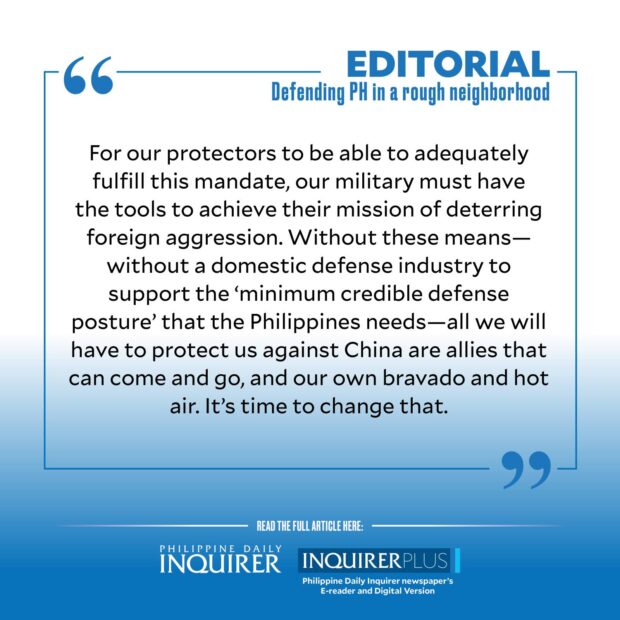
The Philippines renounces war as an instrument of national policy, adopts the generally accepted principles of international law as part of the law of the land and adheres to the policy of peace, equality, justice, freedom, cooperation, and amity with all nations.”
Thus reads Article II, Section 2 of the 1987 Constitution declaring the country’s principles and state policies for all Filipinos to abide by.
It is a good stance to adopt. But it is, unfortunately, easier said than done, especially in the over three decades that have passed since those words became part of our basic legal pillars.
Renouncing war and embracing international law is ideal, but can be challenging when confronted by a giant neighbor that routinely threatens others in the neighborhood with its military might and displays abject contempt for international law, especially where territories are concerned.Proclaiming amity with all nations is well and good, but can feel a little hollow when a nation like China repeats well-worn lines about friendship between our peoples, but encroaches on one’s exclusive economic zone, builds permanent structures within them, positions military assets on reclaimed islands a stone’s throw away from us, and proceeds to steal the resources in the area, not least of which are the maritime wealth that helps sustain Filipino fishermen.Being a good country is easier said than done, especially when faced with China’s bullying in recent years.
But stand up to a bully we must, and doing so means developing the ability to—in the worst case scenario, knock on wood—give any militarily stronger aggressor the proverbial bloody nose should they choose to press their luck against a peace-loving nation like ours.
To this end, the proposal of senators to allocate P1 billion as seed money to help grow the country’s defense industry has merit.
We should support the proposed Self-Reliant Defense Posture Revitalization Act being championed by Senate President Juan Miguel Zubiri, and backed by Senators Loren Legarda, Joel Villanueva, Ramon Revilla Jr., Jinggoy Estrada, Imee Marcos, and Sherwin Gatchalian which seeks to “revitalize the country’s self-reliance defense posture program and to fully harness the potential of the defense industry at a time when security threats are imminent and continue to evolve.”
The Philippines does have a small private defense industry, mainly manufacturing small arms and ammunition, but more is needed for this country to be able to harness its intellectual and technological talents and use these to secure the nation’s interests against miscreants in the region.
The proposed P1-billion seed capital is small compared to what this country needs after decades of having the military focus on internal security concerns rather than external defense. But it is an important start that could potentially get the ball rolling and invite greater private sector investment that will ultimately lead to a stronger defense posture, and help create a more vibrant economy as a bonus. The ongoing Armed Forces of modernization program should also be geared toward achieving this goal.
At the same time, our policymakers must harness the ever-growing international support of our like-minded allies, like that offered by Japanese Prime Minister Fumio Kishida during his recent visit. Relying on our international partners for military support, especially on the United States, is nothing new to the Philippines for we have done so for decades.
But this time around, our leaders should ensure that we rely on our allies not as a crippled country relying on external crutches permanently, but as a revitalized nation learning to walk, nay run, after leaning on stronger friends for so long.
Growing a local defense industry will not happen overnight. But we must begin now if we hope to one day wish to be freed from the necessity of taking sides in a conflict between superpowers.
Indeed, Article II, Section 2 of our country’s fundamental law mandates that we be a peaceful nation, that follows globally established rules and aspires to be a friend to all and an enemy to none.
But what if that isn’t possible? What should we do when faced with the clear and present danger of another country taking what is rightfully ours? The answer is written in the very next line of the very same document.
“The Armed Forces of the Philippines is the protector of the people and the State. Its goal is to secure the sovereignty of the State and the integrity of the national territory,” reads Article II, Section 3 of the 1987 Constitution.
And for our protectors to be able to adequately fulfill this mandate, our military must have the tools to achieve their mission of deterring foreign aggression. Without these means—without a domestic defense industry to support the “minimum credible defense posture” that the Philippines needs—all we will have to protect us against China are allies that can come and go, and our own bravado and hot air.
It’s time to change that.